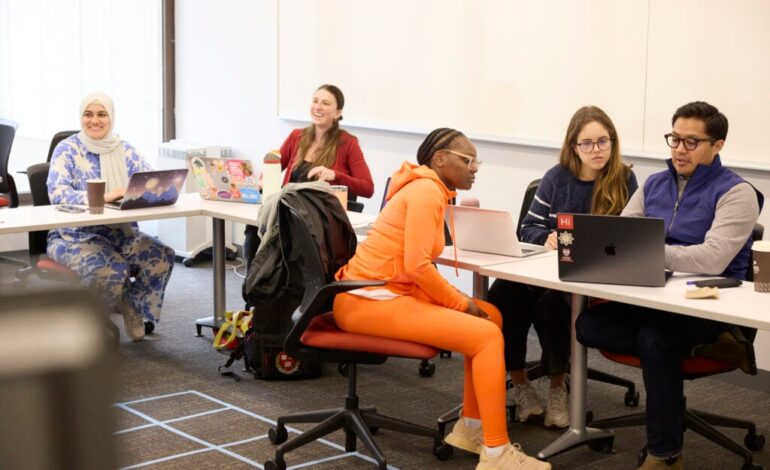Students Dive into Health Debates at Inaugural Camp Cura

In August 2025, a group of eleven students participated in the inaugural session of Camp Cura, a new initiative at Harvard T.H. Chan School of Public Health aimed at fostering constructive discussions around controversial health topics. This innovative program encouraged students to engage with complex health issues in an environment focused on curiosity and care, qualities that co-founder and associate professor, Michaela Kerrissey, identified as essential for effective public health discourse.
The concept for Camp Cura emerged from Kerrissey’s reflections on the polarized nature of health debates, particularly following the contentious discussions surrounding the origins of COVID-19. “Some well-respected virologists have described that debate as the most toxic one they’ve ever been part of,” she noted. Recognizing the need for future public health leaders to navigate these challenging conversations, Kerrissey sought to create a space where students could practice flexible thinking and develop their communication skills.
Camp Cura, named after the Latin roots for “curiosity” and “care,” took place from August 18-22, 2025. Participants included a mix of current and incoming students, postdoctoral fellows, and other health professionals. The program was designed to include individuals who were not only curious but also committed to improving public health communication. “We had a lot of interest,” Kerrissey remarked, acknowledging that some applicants had to be turned away to keep the inaugural group small.
Students like Sami Bailey and Will Sayre sought to gain insights on how to communicate health information effectively amidst rising vaccine skepticism and waning trust in public health institutions. Bailey, who witnessed the spread of vaccine skepticism in her rural community in eastern Washington, expressed her desire to learn how to engage in difficult conversations. “I wanted to learn how to communicate about these issues that feel hard to talk about,” she explained.
Sayre, a medical student from the University of South Florida, echoed this sentiment, noting that he frequently encountered patients struggling to sift through competing health narratives. “I saw Camp Cura as an opportunity to immerse myself in these thorny discussions,” he said.
Through collaborative research, students tackled pressing health topics such as autism rates, the implications of artificial intelligence in healthcare, the impact of microplastics, and the use of GLP-1 medications for weight loss. Each group engaged in in-depth discussions, examining the strengths and weaknesses of existing research and identifying key areas for future inquiry.
Kerrissey emphasized the importance of discerning competing narratives. “Today’s leaders need to be able to discern and make sense of competing narratives and be comfortable changing their minds,” she stated. The program encouraged participants to reflect on their experiences, fostering a deeper understanding of the complexities surrounding health debates.
At the conclusion of the week, students presented their findings to peers and a panel of health care industry leaders, marking a culmination of their intensive discussions. Bailey noted that the experience equipped her with the tools necessary to lead difficult conversations with empathy. “What I realized at Camp Cura is… empathy isn’t an endorsement,” she said. This understanding allowed her to approach public health issues with a more open mindset.
Each day of Camp Cura featured insights from experts in health communication. Presentations covered topics ranging from narrative leadership to the effective use of social media in disseminating health information. Notable speakers included Pedja Stojicic, adjunct lecturer on health policy, and Ankur Pandya, associate professor of health decision science. Their insights reinforced the notion that storytelling and relationship-building are critical components of effective public health communication.
Kerrissey described the experience as “fantastic,” expressing her own growth alongside the students. “I walked out of campers’ final presentations having updated my own prior understandings about all of the issues they covered,” she shared. Her vision for Camp Cura is to expand the program in alignment with Harvard Chan School’s Learning and Engaging Across Differences (LEAD) initiative, promoting the idea that disagreement can occur without animosity.
“Disagreement can happen without being unkind,” Kerrissey concluded. “On the other side of the discomfort that often accompanies disagreement can be joy—the joy of updating your own assumptions and learning something new.” As the inaugural Camp Cura wrapped up, it set a precedent for how future public health leaders can navigate complex conversations in an increasingly polarized landscape.






